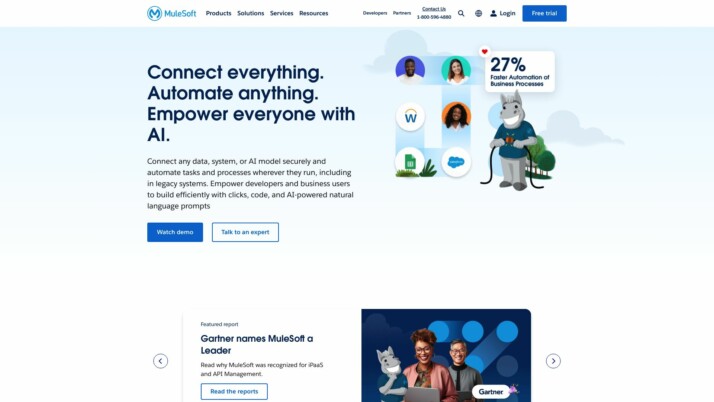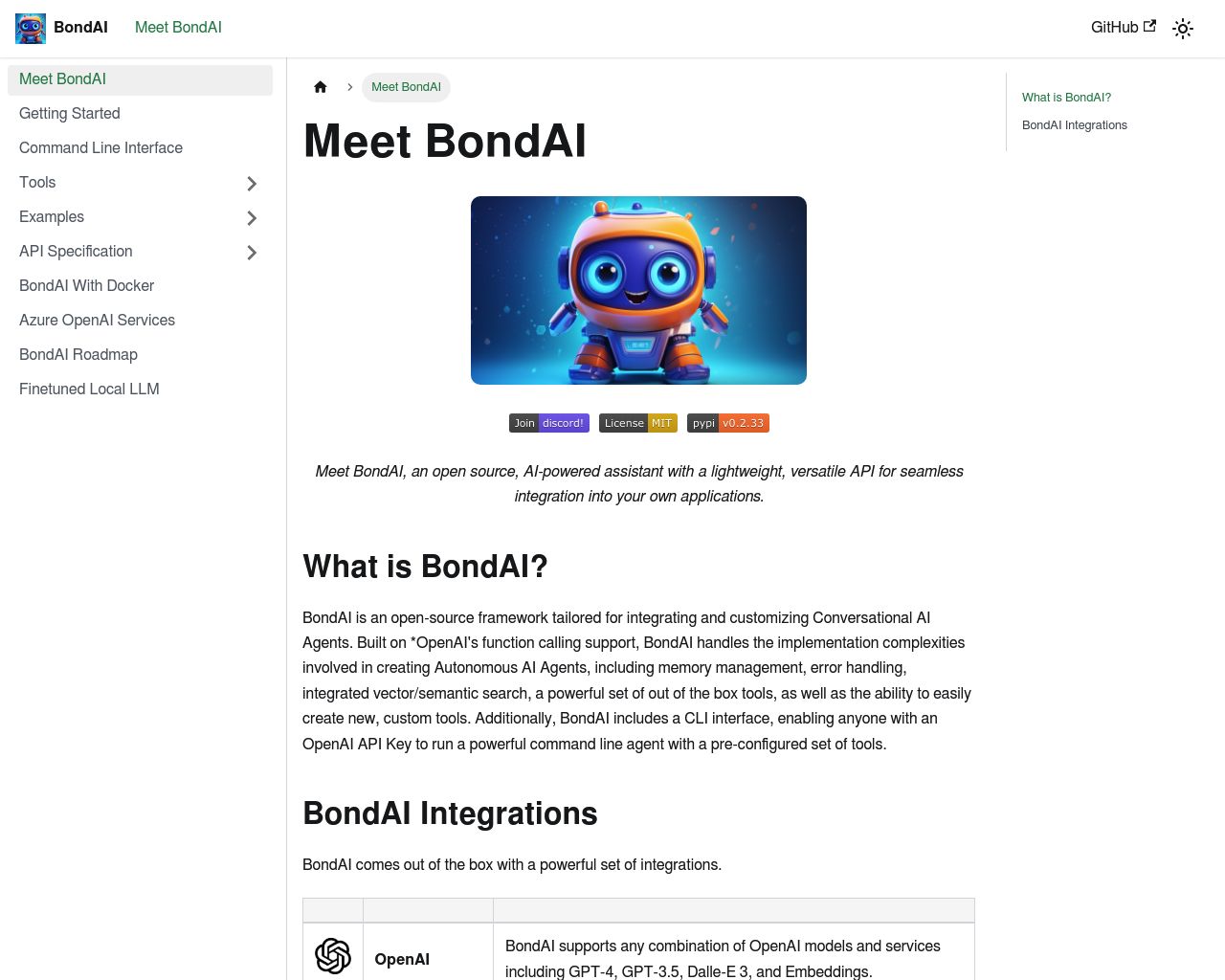Mulesoft vs. BondAI: Comparing Enterprise Integration and AI Development
AI platforms have transformed from niche tools to essential business assets, driving innovation across industries. Mulesoft vs. BondAI, and SmythOS each offer unique approaches to harnessing AI’s power. This comparison delves into their core strengths, examining how Mulesoft’s enterprise integration capabilities, BondAI’s open-source flexibility, and SmythOS’s user-friendly AI development stack up.
We’ll explore key features, use cases, and target audiences, equipping you with the insights needed to choose the right AI solution for your organization’s goals. Whether you’re a developer seeking advanced AI tools, a business leader focused on scalability, or an entrepreneur looking for accessible AI solutions, this analysis will guide your decision-making process.
Mulesoft Overview
Mulesoft transforms enterprise connectivity with its comprehensive integration and API management platform. The Anypoint Platform empowers organizations to design, build, and manage APIs, fostering seamless data exchange across diverse systems and applications. Mulesoft’s approach to API-led connectivity enables businesses to create reusable assets, enhancing agility and accelerating digital transformation initiatives.


The Anypoint Platform empowers organizations to design, build, and manage APIs, fostering seamless data exchange across diverse systems and applications.
The platform’s core strength lies in its versatility, catering to both technical and non-technical users. Developers leverage Anypoint Studio, a powerful visual development environment, to craft sophisticated integrations. Meanwhile, business users can utilize Flow Builder, a no-code tool for creating integrations without writing complex code. This dual approach democratizes integration capabilities, allowing organizations to maximize their existing talent while addressing the growing demand for connected systems.
Mulesoft excels in supporting AI-driven initiatives. The platform seamlessly integrates with AI models like OpenAI and custom solutions, enabling businesses to harness AI’s potential across various use cases. Mulesoft’s Einstein AI integration enhances developer productivity by generating MuleSoft flows from natural language prompts and facilitating intelligent data mapping. This AI-powered assistance accelerates project initiation and streamlines development processes.
Mulesoft’s Einstein AI integration enhances developer productivity by generating MuleSoft flows from natural language prompts and facilitating intelligent data mapping.
While Mulesoft offers robust features, some users may find the learning curve steep, particularly when delving into advanced functionalities. The platform’s extensive capabilities can be overwhelming for smaller organizations with limited IT resources. Additionally, pricing for enterprise-grade features may be a consideration for budget-conscious teams.
Mulesoft’s commitment to security and governance stands out in the integration landscape. The Anypoint Flex Gateway and API Governance features ensure that organizations can maintain control and visibility over their APIs and data flows. This emphasis on security is crucial for businesses operating in regulated industries or handling sensitive information, providing peace of mind in an increasingly complex digital ecosystem.
BondAI Overview
BondAI offers an open-source framework for developing AI Agent Systems. The platform simplifies the complexities of creating autonomous AI agents, focusing on key aspects like memory management, error handling, and semantic search capabilities.


BondAI supports advanced AI architectures, including ReAct Agents and ConversationalAgents inspired by the AutoGen framework. These systems enable both individual interactions and multi-agent collaborations, pushing the boundaries of single-agent models. The framework integrates seamlessly with popular services like OpenAI models, Azure, Google Search, and LangChain, making it versatile for applications ranging from research to customer support.
BondAI offers an open-source framework for developing AI Agent Systems. The platform simplifies the complexities of creating autonomous AI agents, focusing on key aspects like memory management, error handling, and semantic search capabilities.
A standout feature of BondAI is its robust memory management system, inspired by the MemGPT paper. This tiered approach efficiently handles extensive contexts and complex conversations, enhancing the agents’ problem-solving capabilities. The system comprises core memory for immediate tasks, conversation memory for dialogue history, and archival memory for long-term data storage.
A standout feature of BondAI is its robust memory management system… This tiered approach efficiently handles extensive contexts and complex conversations, enhancing the agents’ problem-solving capabilities.
BondAI offers flexibility in deployment, available via CLI, Docker containers, or direct integration into codebases. This versatility allows users to quickly start with pre-configured tools or build custom agents. However, the open-source nature of BondAI may present challenges in terms of enterprise-grade support and seamless scalability compared to some commercial alternatives.
While BondAI excels in providing a comprehensive toolkit for AI agent development, it may require more technical expertise to fully utilize its capabilities. This could potentially limit its accessibility for non-technical users or smaller businesses looking for out-of-the-box solutions. Additionally, as an open-source platform, users might need to invest more time in setup and maintenance compared to fully managed services.
Feature Comparison
Mulesoft and BondAI offer distinct approaches to AI agent development and integration. Mulesoft excels in enterprise-grade API management and integration capabilities, while BondAI provides a flexible open-source framework for AI agent systems.
Mulesoft’s Anypoint Platform delivers robust API lifecycle management, including design, implementation, and governance. Its visual development environment, Anypoint Studio, enables both technical and non-technical users to create sophisticated integrations. In contrast, BondAI focuses on simplifying AI agent development with advanced memory management and support for complex AI architectures like ReAct Agents and ConversationalAgents.
While both platforms support AI integration, their approaches differ. Mulesoft’s Einstein AI enhances developer productivity by generating flows from natural language prompts and facilitating intelligent data mapping. BondAI, on the other hand, provides a framework for building autonomous AI agents with tiered memory systems inspired by recent research. This allows for more complex, context-aware AI interactions but may require more technical expertise to implement fully.
In terms of security, Mulesoft offers enterprise-grade features like Anypoint Flex Gateway and comprehensive API governance. BondAI, being open-source, relies more on user implementation for security measures. This difference highlights Mulesoft’s strength in meeting enterprise security and compliance needs, while BondAI offers more flexibility for customization in security implementations.
Feature Comparison Table
| Mulesoft | BondAI | SmythOS | |
|---|---|---|---|
| CORE FEATURES | |||
| Visual Builder | ✅ | ❌ | ✅ |
| No-Code Options | ✅ | ❌ | ✅ |
| Memory & Context | ❌ | ✅ | ✅ |
| Explainability & Transparency | ❌ | ✅ | ✅ |
| Problem-Solving Capabilities | ❌ | ✅ | ✅ |
| Human-AI Interaction | ❌ | ✅ | ✅ |
| Audit Logs for Analytics | ❌ | ❌ | ✅ |
| SECURITY | |||
| Constrained Alignment | ✅ | ❌ | ✅ |
| Data Encryption | ❌ | ✅ | ✅ |
| IP Control | ✅ | ❌ | ✅ |
| COMPONENTS | |||
| Huggingface AIs | ❌ | ✅ | ✅ |
| Zapier APIs | ❌ | ✅ | ✅ |
| All other APIs, RPA | ❌ | ✅ | ✅ |
| Logic | ❌ | ✅ | ✅ |
| Data Lakes | ✅ | ❌ | ✅ |
| DEPLOYMENT OPTIONS (EMBODIMENTS) | |||
| Staging Domains | ✅ | ❌ | ✅ |
| Deploy as Scheduled Agent | ❌ | ❌ | ✅ |
| Scalability | ❌ | ✅ | ✅ |
| DATA LAKE SUPPORT | |||
| Hosted Vector Database | ✅ | ❌ | ✅ |
| Sitemap Crawler | ❌ | ❌ | ✅ |
| YouTube Transcript Crawler | ❌ | ❌ | ✅ |
| URL Crawler | ❌ | ✅ | ✅ |
| PDF Support | ❌ | ✅ | ✅ |
Best Alternative to Mulesoft and BondAI
SmythOS emerges as the superior alternative to Mulesoft and BondAI, offering a comprehensive agentic AI automation platform that combines ease of use, extensive features, and unlimited use cases. We’ve designed SmythOS to address the limitations of traditional integration platforms and open-source AI frameworks, providing a solution that empowers users to create and deploy sophisticated AI agents quickly and efficiently.
Our platform stands out with its intuitive drag-and-drop interface, enabling users to build complex AI workflows without extensive coding knowledge. This visual approach significantly reduces development time and makes advanced AI capabilities accessible to a broader audience, from seasoned developers to business users seeking to innovate their processes.
SmythOS offers a versatile ecosystem that supports a wide range of AI models and integrations… allowing users to leverage existing tools while expanding their capabilities with AI.
Unlike Mulesoft’s focus on API management or BondAI’s emphasis on research-driven AI architectures, SmythOS offers a versatile ecosystem that supports a wide range of AI models and integrations. We provide pre-built connectors for popular services and APIs, allowing users to leverage existing tools while expanding their capabilities with AI. This flexibility ensures that SmythOS can adapt to virtually any business need or industry-specific requirement.
One of our key advantages is the ability to create and manage autonomous agents that can perform complex tasks, interact with various data sources, and collaborate in multi-agent systems. This level of sophistication goes beyond traditional integration platforms, enabling businesses to automate intricate processes and decision-making tasks that previously required human intervention. With features like advanced memory management, context-aware interactions, and robust problem-solving capabilities, SmythOS agents can handle a diverse array of challenges across industries.
Moreover, SmythOS addresses critical concerns in AI deployment, such as scalability, security, and transparency. We offer enterprise-grade security features, including data encryption and constrained alignment, ensuring that AI agents operate within defined parameters and comply with organizational policies. Our platform also provides comprehensive audit logs and monitoring tools, giving users full visibility into agent activities and facilitating continuous improvement of AI-driven processes.
Conclusion
Mulesoft and BondAI offer powerful solutions for enterprise integration and AI agent development respectively. Mulesoft’s Anypoint Platform excels in API management and enterprise-grade security, making it ideal for large organizations with complex integration needs. BondAI’s open-source framework provides flexibility and advanced AI capabilities, appealing to developers and researchers pushing the boundaries of AI agent systems.
However, SmythOS emerges as the superior choice, combining the strengths of both platforms while addressing their limitations. Our drag-and-drop interface democratizes AI development, allowing both technical and non-technical users to create sophisticated AI agents without extensive coding. With support for over 300,000 integrations, SmythOS offers unparalleled versatility, seamlessly connecting to various data sources, APIs, and AI models.
Unlike Mulesoft’s steep learning curve or BondAI’s technical requirements, SmythOS provides an intuitive environment for rapid development and deployment. Our ’Create Once, Deploy Anywhere’ approach ensures that AI agents built on our platform can be easily integrated across multiple channels, from chatbots to APIs, enhancing your ability to meet diverse business needs.
Experience the future of AI development with SmythOS. Create a free account to start building AI agents today, or explore our extensive documentation to discover how SmythOS can revolutionize your approach to AI integration and automation. With our risk-free trial and 30-day money-back guarantee, there’s never been a better time to unleash the power of AI for your business.
Last updated:
Disclaimer: The information presented in this article is for general informational purposes only and is provided as is. While we strive to keep the content up-to-date and accurate, we make no representations or warranties of any kind, express or implied, about the completeness, accuracy, reliability, suitability, or availability of the information contained in this article.
Any reliance you place on such information is strictly at your own risk. We reserve the right to make additions, deletions, or modifications to the contents of this article at any time without prior notice.
In no event will we be liable for any loss or damage including without limitation, indirect or consequential loss or damage, or any loss or damage whatsoever arising from loss of data, profits, or any other loss not specified herein arising out of, or in connection with, the use of this article.
Despite our best efforts, this article may contain oversights, errors, or omissions. If you notice any inaccuracies or have concerns about the content, please report them through our content feedback form. Your input helps us maintain the quality and reliability of our information.
